Showing 241–252 of 301 results

The Journey of Advaita elucidates the richness, depth and profundity of Advaitic thought right from the Vedas to the Integral Advaitism of Sri Aurobindo, and further how it is being incorporated in modern science. In its long journey, it found its blossom in Shankaras Kevaladvaita, and in its further growth, Bhakti-Vedanta played an important role through Ramanuja, Madhva, Nimbarka and Vallabha.
The Journey of Advaita elucidates the richness, depth and profundity of Advaitic thought right from Vedas to Integral Advaitism of Sri Aurobindo and further how it is being incorporated in modern science.
Advaita Philosophy is not a later development of thought as one of the six systems of Indian philosophy. Vedas are replete with suggestions about Unity. The earlier stage of naturalistic and anthropomorphic polytheism yielded to monistic belief. In the dictum, ekam sad vipra bahudha vadanti we perceive an echo of Unity. Upanishadic seers picked up this Unity and tirelessly went in their search till they came to the highest conclusion, tat tvam asi.
This concept of Unity gets its full bloom in Shankaras Kevaladvaita; later on it gave inspiration to different rivulets of Vedanta schools. Shankaras unqualified impersonal Brahman could not satisfy those who sought loving communion with God. Consequently different schools of Bhakti-Vedanta came into existence, namely, Vishishtadvaita of Ramanuja, Dvaita of Madhva, Dvaitadvaita of Nimbarka and Shuddhadvaita of Vallabha. For all of them the emphasis is on the liberation of individual soul only, which gave way to Sri Aurobindos Integral Advaitism where the emphasis is not only on spiritualization of man but of the whole cosmos.
The journey continues further with modern physics. Consciousness is the building block of the Universe and the ground of all beings, which cant be found in plural.

This book in three parts is unique as it depicts the life of this spiritual preceptor, chronologically detailing the varied roles he played to change the social, economic, political, religious and spiritual life of the people and the countless incredible miracles he performed during his 72 years of worldly existence.
The relevance and importance of the teachings of the saint-poet-philosopher-social reformer Sree Narayana Guru are increasing day by day and have been influencing millions of people all over the world. Of the hundreds of biographies of Guru, this book in three parts is unique as it depicts the life of this spiritual preceptor, chronologically detailing the varied roles he played to change the social, economic, political, religious and spiritual life of the people and the countless incredible miracles he performed during his 72 years of worldly existence.
The book provides an in-depth study of the social conditions prevailing in the nineteenth and twentieth centuries of Kerala. A picture is clearly drawn on how an avarna liberated a society steeped in ignorance to such heights that the higher-ups in social order could not even dream of, by a bloodless spiritual revolution. The different roles Guru enacted in his life and the numerous miracles he performed, not highlighted so far in any biography, find a prominent place in this book. The life of Guru is presented here as it was. Readers can form their own conclusions about this great soul. The Foreword by Prof. M.K. Sanoo is a window to enter into the insight of the life of the Guru.
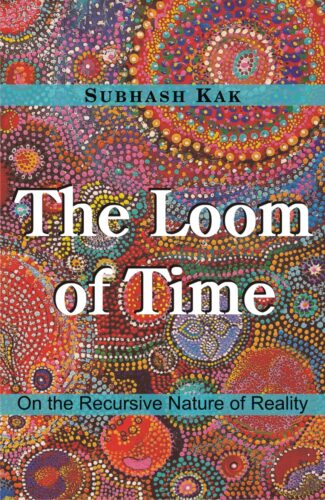
It shows how reality is generated in a recursive fashion and uses this insight to illuminate many puzzles of history and culture. The book straddles history and science, aesthetics and religion, and politics and power, by juxtaposing material in ways that provide surprising new insights.
The Loom of Time shows how reality is generated in a recursive fashion and uses this insight to illuminate many puzzles of history and culture. Recursion is at basis of mimicry in nature and germination and development of biological organisms; it also provides structure to mental images of physical systems and human behavior. It helps us make sense of the repeating patterns across cultures and nations, understand the manner in which technology is impacting society, and see the reasons behind the crises of the contemporary world.
The topics covered in this book include philosophical bases of recursion, cosmologies old and new, religion and modernity, globalization and bureaucratic control, loss of meaning and freedom, spirituality, narcissism leading to despair, and limits of medicine. It deals with problems of employment and questions of meaning of life when robots and other machines become more numerous than humans. The book straddles history and science, aesthetics and religion, and politics and power, by juxtaposing material in ways that provide surprising new insights.
The essays included in this book provide highly critical and creative analysis of some of the basic problems of normative and meta—ethies in a pleasantly readable language. They can be enjoyably and profitably read by technical philosophers as well as interested bymen. Professor Prasad writes on ethical issues as seminal, conceptual issues of moral philosophical, and not as issues arising out of some regional, Indian or non-Indian, instances of moral thinking. Even ethical issues, generally discussed as rooted in classical Indian thinking, have been discussed by him as basic ones of moral philosophising, and thereby he raises the status of some classical Indian views to a level at which their conceptual, general or non-regional, role becomes crystac clear, His writings by to bridge the gulf wrongly created by some others, between Indian and Western moral theorising.
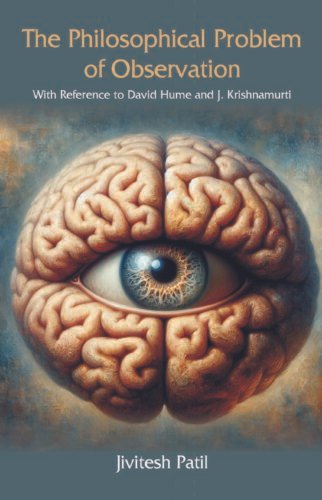
It talks about the contrasting philosophies of J. Krishnamurti and David Hume navigating the convergence of their thoughts on the observer’s role in the process of observation. In so doing, it delves into the world of philosophy of mind as it spans ancient to modern times.
“The Philosophical Problem of Observation with Reference to David Hume and J. Krishnamurti offers a sophisticated exploration of the intricate relationship between perception, the self and the observer. Engaging with the empiricism of David Hume and the meditative insights of J. Krishnamurti, the book delves into fundamental questions about the nature of observation, its role in shaping human understanding, and its implications for knowledge and consciousness. Dr Patil critically examines Hume’s dissection of perception and belief alongside Krishnamurti’s radical proposition of observation without an observer, illuminating their shared rejection of a permanent self. By bridging distinct philosophical traditions, this book investigates the transformative potential of a pure, unconditioned state of perception and challenges entrenched notions of cognition and the self.
Addressing key questions such as the influence of memory and belief on perception and the unity of the observer and the observed, the book presents a compelling dialogue between philosophical inquiry and practical introspection. It weaves philosophy, psychology, and consciousness studies into an interdisciplinary framework for achieving clarity into the question of self and observation. This thought-provoking work is an essential read for scholars of philosophy and cognitive science, as well as seekers of deeper understanding. With its innovative insights, it offers a roadmap for navigating the philosophical dimensions of perception and unlocking the transformative aspect of observation.”
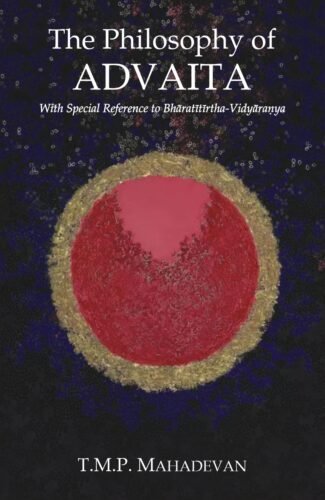
The book is an attempt to present systematically the philosophy of Advaita as expounded by BhÀratÁtÁrtha-VidyÀraõya, an outstanding figure in the History of Advaita after Œaôkara, and to assess the contribution of that great scholar-saint to the Vivaraõa school in particular and to Advaita metaphysics in general.
“This volume presents the Advaita philosophy with special reference to the teaching of BhÀratÁtÁrtha-VidyÀraõya. BhÀratÁtÁrtha is an outstanding name in the history of Advaita after Œaôkara. The volume of Advaita literature has grown enormously in the post-Œaôkara period, necessitated by charges and countercharges. Amidst numerous such works, VidyÀraõya develops his Advaita position in a striking way.
While dealing with all the quintessential concepts of Advaita philosophy, the book is an attempt to present systematically the philosophy of Advaita as expounded by BhÀratÁtÁrtha-VidyÀraõya and to assess the contribution of that great scholar-saint to the Vivaraõa school in particular and to Advaita metaphysics in general. It thus encompasses all major topics of Advaita such as its epistemological position including six pramÀõas, truth and error, reality as existence and bliss, the concepts of witness-Self, MÀyÀ, path to perfection and release.
The present treatise would thus help students of Indian philosophy in getting to know the main concepts of Advaita doctrine vis-à-vis other philosophical systems of India, making it a must need collection, enabling them widen their horizon of knowledge.
“
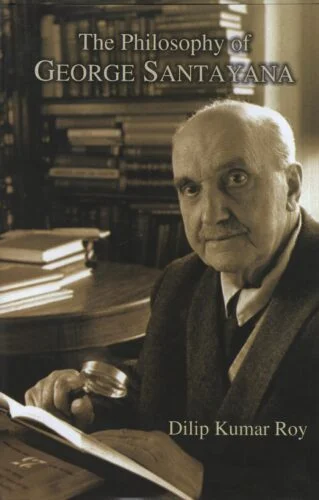
This book discusses the quintessential aspects of George Santayana’s wide and comprehensive philosophy. Its critical and comparative discussions have taken place centring round the problems of Epistemology, Metaphysics, Aesthetics, Ethics and Religion, thereby making it all the more interesting.
This book discusses the quintessential aspects of George Santayana’s wide and comprehensive philosophy. Its critical and comparative discussions centre round the problems of Epistemology, Metaphysics, Aesthetics, Ethics and Religion. This makes it all the more interesting.
What is noteworthy about this book is that it shows how naturalism serves as a basis of the idealistic philosophy of George Santayana. Moreover, the illustrious part of this treatise is that essence, as discovered by Santayana by the doubting process, serves as the keynote of his whole philosophy.
The exposition of Santayana’s philosophy on the basis of the above two points is an outstanding feature of the present work. What is captivating about this book is that it shows how the natural gets reconciled with the ideal by making the former the ground of the latter.
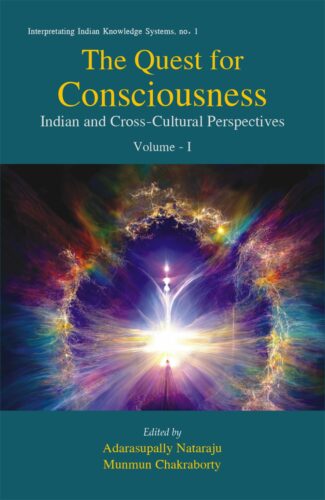
The book addresses the main theme of the nature of consciousness from a wide-ranging stances and have also taken a step towards establishing a platform for an intense and critical study of Indian theories of consciousness
The book provides a platform to discuss and examine the subtle and complex issues related to the nature of consciousness, self, mental states and subjectivity from Indian and cross-cultural perspectives. It explores contemporary problems of consciousness and tries to find solutions from Indian philosophical traditions. The purpose is to understand how far the views and approaches of classical and contemporary Indian thinkers are relevant in contemporary consciousness studies. The book argues that great thinkers of Vedānta, Tantra, Sāṁkhya and Buddhism have done enormous works which can be explored, examined and enhanced even today for a better comprehension of the subjectivity and conscious experience.
The chapters of this present volume have thoroughly explored and examined many classical Indian theories of consciousness. Keeping in view the objectives of this volume, the contributors have made an effective effort to reflect critically on Indian theories to answer the contemporary problems. There are chapters discussing and examining the standpoints of Indian thinkers like Abhinavagupta, Utpala, Śaṅkara, Rāmānuja, Swāmī Vidyāraṇya, Nāgārjuna, Gautama and many more. On the other hand, there are chapters engaged in reappraising the philosophical positions of Kant, Hegel, Sartre, Chalmers, Searle, Dennett and other contemporary thinkers. The chapters of this volume have addressed the main theme from a wide-ranging stances and have also taken a step towards establishing a platform for an intense and critical study of Indian theories of consciousness.
The book is extremely beneficial for students and scholars interested in classical Indian philosophy and contemporary consciousness studies. It inspires more researchers to ponder upon the concept of consciousness and subjectivity from multiple dimensions.
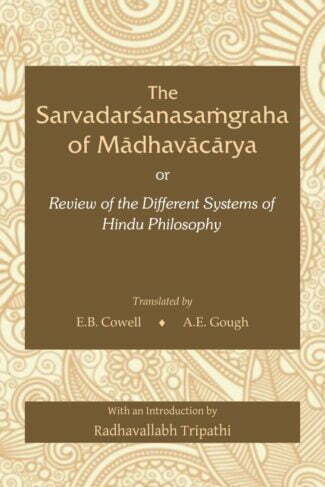
This book is an interesting specimen of Hindu critical ability. It presents the synopsis of sixteen philosophical systems that were current in the fourteenth-century south India in their most important tenets and maintains the principal arguments by which their followers were endeavoured to maintain them.
The Sarvadarshanasamgraha of Madhavacharya is an interesting specimen of Hindu critical ability. The author herein presents the synopsis of sixteen Charvaka, Bauddha, Jaina, Ramanuja, Purnaprajna, Pashupata, Shaiva, Pratyabhijna, Raseshvara, Vaisheshika, Nyaya, Jaiminiya, Paniniya, Samkhya, Patanjala and Advaita philosophical systems current in the fourteenth-century south India in their most important tenets and maintains the principal arguments by which their followers were endeavoured to maintain them. In course of his sketches of these systems, Madhavacharya frequently explains at length obscure details of these different systems.
Sarvadarshanasamgraha presents all these Darshanas from the Vedantic point of view. These had attracted to their study the noblest minds in India throughout the medieval period of its history. There were numerous sects of Bauddha, Jaina, and Hindu philosophical systems and we come across many of them in this book.
This present retypeset edition is quite reader-friendly as we have made a few changes to this edition as value-adds and by incorporating the present-day diacritics.
This English translation of Sarvadarshanasamgraha must evoke keen interest among scholars of philosophy, and researchers and students of philosophy across the globe.

This book is an interesting specimen of Hindu critical ability. It presents the synopsis of sixteen philosophical systems that were current in the fourteenth-century south India in their most important tenets and maintains the principal arguments by which their followers were endeavoured to maintain them.
The Sarvadarshanasamgraha of Madhavacharya is an interesting specimen of Hindu critical ability. The author herein presents the synopsis of sixteen Charvaka, Bauddha, Jaina, Ramanuja, Purnaprajna, Pashupata, Shaiva, Pratyabhijna, Raseshvara, Vaisheshika, Nyaya, Jaiminiya, Paniniya, Samkhya, Patanjala and Advaita philosophical systems current in the fourteenth-century south India in their most important tenets and maintains the principal arguments by which their followers were endeavoured to maintain them. In course of his sketches of these systems, Madhavacharya frequently explains at length obscure details of these different systems.
Sarvadarshanasamgraha presents all these Darshanas from the Vedantic point of view. These had attracted to their study the noblest minds in India throughout the medieval period of its history. There were numerous sects of Bauddha, Jaina, and Hindu philosophical systems and we come across many of them in this book.
This present retypeset edition is quite reader-friendly as we have made a few changes to this edition as value-adds and by incorporating the present-day diacritics.
This English translation of Sarvadarshanasamgraha must evoke keen interest among scholars of philosophy, and researchers and students of philosophy across the globe.

This volume critically examines six epistemological theories of the Advaita school of Vedanta: pratyaksha (perception), upamana (comparison), anupalabdhi (non-cognition), anumana (inference), arthapatti (postulation) and shabda (testimony), highlighting the problems, concepts and theories of the Vedantins within the focus of modern Western thought.
This volume critically examines six epistemological theories of the Advaita school of Vedanta: pratyaksha (perception), upamana (comparison), anupalabdhi (non-cognition), anumana (inference), arthapatti (postulation) and shabda (testimony). To make the study smooth and easy, it deliberates on two other concepts prama (conceptions of knowledge) and pramana (methods of knowing) as these underlie all epistemological discussions.
The book highlights the problems, concepts and theories of the Vedantins within the focus of modern Western thought. The method adopted is one of critical analysis, comparison and evaluation. It also tries to formulate some important epistemological doctrines of Advaita Vedanta and show by some criticism that, if rightly understood, they are valuable contributions to the philosophy of the world.
The book, targeting sceptical students trained in Western philosophy and an imagined tribunal of Western philosophers, tries to make a case for Advaita Vedanta, and thus is expected to usher keen interest among the students, teachers and followers of Advaita Vedanta.

This volume critically examines six epistemological theories of the Advaita school of Vedanta: pratyaksha (perception), upamana (comparison), anupalabdhi (non-cognition), anumana (inference), arthapatti (postulation) and shabda (testimony), highlighting the problems, concepts and theories of the Vedantins within the focus of modern Western thought.
This volume critically examines six epistemological theories of the Advaita school of Vedanta: pratyaksha (perception), upamana (comparison), anupalabdhi (non-cognition), anumana (inference), arthapatti (postulation) and shabda (testimony). To make the study smooth and easy, it deliberates on two other concepts prama (conceptions of knowledge) and pramana (methods of knowing) as these underlie all epistemological discussions.
The book highlights the problems, concepts and theories of the Vedantins within the focus of modern Western thought. The method adopted is one of critical analysis, comparison and evaluation. It also tries to formulate some important epistemological doctrines of Advaita Vedanta and show by some criticism that, if rightly understood, they are valuable contributions to the philosophy of the world.
The book, targeting sceptical students trained in Western philosophy and an imagined tribunal of Western philosophers, tries to make a case for Advaita Vedanta, and thus is expected to usher keen interest among the students, teachers and followers of Advaita Vedanta.